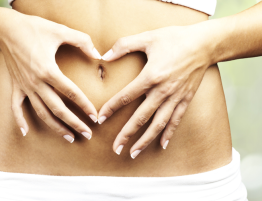
The gut is home to billions of bacteria that assist in breaking down food for effective nutrient absorption. Because of its unique function, the gut microbiome is undeniably important for keeping us alive and healthy. Would you like to learn how you can support good bacteria and achieve better overall balance in your gut? At Timeless Wellness Clinic in Pleasanton, CA, you can discover ways to attain optimum health with the help of our microbiome balancing programs.
How Can I Balance My Microbiome?
The best way to get started with microbiome balancing is by focusing on your diet. Do you have a diet that primarily consists of processed foods and sugar? If so, it’s more likely for bad bacteria to overpower the beneficial ones. That’s why in our microbiome balancing programs, we emphasize the role of consuming fiber and plant-based foods when it comes to helping good bacteria thrive.
Additionally, keep in mind that your diet is not the only cause of poor gut health. Your lifestyle matters, too. By making healthy changes to the way you live, you can promote better gut balance. We can help you reflect on your overall lifestyle, rituals, and habits to bring your body back into its natural balance.
Eat a Fiber-Rich, Plant-Based Diet
Fiber keeps your digestive tract moving so that good bacteria can flourish. If you suffer from constipation and experience inflammation in the digestive tract, you may need to consume more fiber. Vegetables and fruits are the best sources of fiber for a diet that supports microbiome balancing.
Increase Daily Intake of Fermented Foods
Are you familiar with fermented foods, such as kimchi, kefir, tempeh, and miso? These delicious foods are rich in good bacteria that can help maintain balance and diversity in your microbiome. Fermented foods also naturally contain good probiotics that are developed during the fermentation process. We recommend that you aim for up to two servings of fermented food daily.
Consume Prebiotic-Rich Foods
The good bacteria in your gut are fueled by prebiotics. By consuming a diet rich in indigestible fibers found in plant-based foods, you can support good bacteria and relieve the symptoms of various digestive problems. Some of the best sources of prebiotics are onions, artichokes, green bananas, oatmeal, and potatoes.
Add Polyphenol-Rich Foods to Your Diet
Polyphenols are micronutrients that can decrease inflammation, inhibit bad bacteria, and promote the growth of good bacteria in the gut. Try incorporating antioxidant foods like green tea, blueberries, cherries, and dark chocolates that contain polyphenols.
Consider Taking Probiotics
Most probiotics contain beneficial live bacteria that can promote balance in your gut. Lactobacillus and Bifidobacterium species are included in most probiotic products. You can add fermented foods, such as yogurt with live cultures, pickled vegetables, and kimchi, to your diet to take advantage of probiotics that support a healthy microbiome.
Engage in Regular Exercise
Did you know that a sedentary lifestyle can cause an imbalance in your gut microbiome? In our microbiome balancing programs, we emphasize the importance of getting regular exercise to increase the number of good bacteria in your digestive system.
By focusing on simple but regular exercise, you can take significant steps to balance your microbiome. It’s a good idea to start small and exercise for a few days a week if you live a sedentary lifestyle.
Minimize Stress
Do you suffer from constant physical, emotional, and environmental stress? Your gut can become vulnerable when you don’t get the relaxation your body needs. With too much stress, your body becomes more prone to immune reactions that lead to gut imbalance.
We know that it’s impossible to eliminate stress completely, but we can guide you towards being more mindful of your daily activities and getting your stress levels under control. We can help you reflect on your daily lifestyle and implement simple exercises to reduce stress.
How Does Poor Microbiome Balance Affect Your Health and Well-Being?
Nutrients From Food Are Poorly Absorbed
The balance between good bacteria and bad bacteria in your microbiome affects how your digestive tract absorbs nutrients from food. Living stressful lifestyles, consuming plenty of processed sugar, and not having enough fiber in your diet can cause your microbiome to become unbalanced.
When your digestive tract can’t effectively absorb nutrients from food, you may be prone to suffering from serious health problems in the future, including food intolerances and allergies.
Mental and Emotional Issues Become More Common
Did you know that your gut is also responsible for processing thought and emotion? It’s no wonder why the gut is also referred to as the second brain. Emotional problems are not only related to the brain. In fact, the gut is home to many biochemicals that govern our moods and emotions. Most of the chemicals that support emotional well-being and self-confidence are made in the gut.
Serotonin and other neurochemicals responsible for regulating your moods and emotions are at optimum levels when you have balance in your microbiome. So when you feel balanced, calm, and confident, it means your gut is functioning as it should, and there’s a healthy balance of bacteria in your microbiome.
Unhealthy Food Cravings Become Prevalent
You’re not the only one who’s responsible for your food choices. The microbes residing within your gut can release signaling molecules that manipulate food cravings, moods, and taste receptors. Because microbiome bacteria can affect your health choices, it’s essential to keep them diverse and well-balanced.
So if you’re thinking about losing weight or changing your diet, you might want to think about the bacteria in your gut first and focus on microbiome balancing before anything else. When you have the right bacteria that will encourage you to crave healthy food, making better choices about what you eat can become much simpler and more manageable.
System-Wide Inflammation Can Occur
Bad bacteria can promote permeability in your gut. This condition is also known as a leaky gut. When this happens, bad bacteria can slip through your delicate gut wall and enter the bloodstream, where they can trigger inflammation throughout the body.
Do you suffer from inflammation such as acne, dermatitis, and chronic pains? The lack of balance in your gut bacteria might be to blame. You can alleviate many symptoms, especially inflammation, by restoring your gut balance first.
Heart Health Suffers
An unhealthy gut can also cause poor heart health. When you have inflammation caused by a leaky gut, your arterial walls can become unstable. As a result, plaque accumulating in your arterial walls can become unstable and break off into the bloodstream. This chain of events can trigger a heart attack.
Improve Your Gut Health Through Microbiome Balancing Programs
By restoring balance in your microbiome, you can prevent inflammation, restore effective digestive function, and avoid permeability in the gut so you can live a longer, healthier life. However, keep in mind that a gut imbalance does not only result in digestive problems. Other areas of your health, such as your mood, heart health, and skin, can also manifest gut imbalance.
Luckily, there are many solutions available when it comes to improving your gut health. To learn more, visit Timeless Wellness Clinic in Pleasanton, CA, and ask about our microbiome balancing programs. We’re here to provide you with the necessary expertise, support, and guidance to adopt a healthy lifestyle that promotes good gut health.








